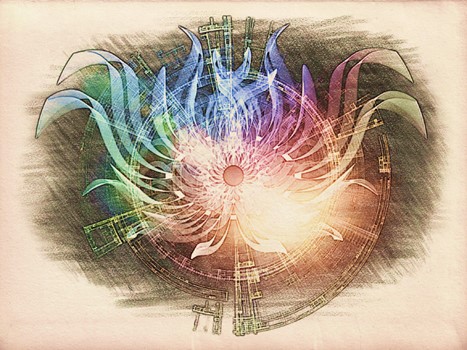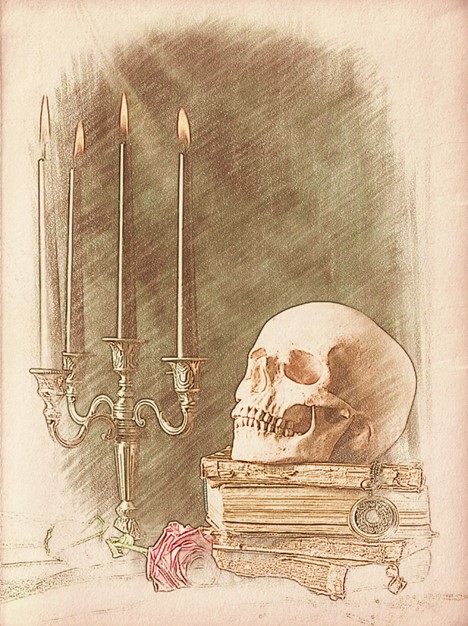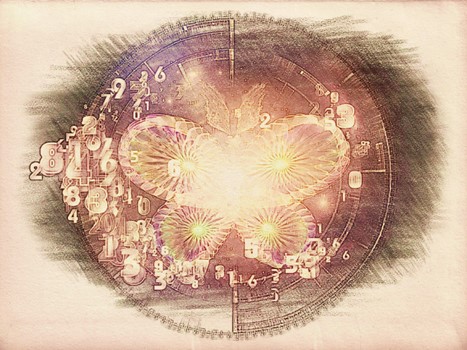The Candle'Bre Magic System
The old Vancian system from "regular" D&D is gone, replaced by a much more flexible spell point system. This change has a huge impact on the game, and required a rewrite of every spell in use.
Depending on what class you choose to play, you'll get a certain number of spell points per level. You may cast any spell you know, any time you like, provided that you have spell points available to do so. Note too that for classes that must prepare their spells in advance (Clerics/Wizards/Artificers), you may cast spells you know but didn't prepare, but you'll pay double the normal cost to do so. This gives casters a tremendous amount of flexibility, and can even make up for poor planning or save a caster's bacon if they get caught in an unanticipated situation.
It also means that spellcasters don't necessarily need their spell books with them, so if the party is kidnapped and stripped of all their gear, Wizards and Artificers can still function, albeit less efficiently than if they had access to their spell books.
There are a number of different spellcasting classes in the Realms (Artificers, Bards, Clerics (and Paladins, which are a subset of Cleric), Rangers, Warlocks and Wizards), and each of them have a different understanding of and relationship to magic. As such, each spellcasting class gains spell points at different rates and based on each class’ understanding, can spend those points in different ways.
The best way to think of spells in the Candle’Bre game world is to imagine them as cups.
A cup of any given size will only hold so much liquid, based on its size, no matter how much you may like to pour additional liquid into it. Try to overfill a cup and the amount beyond what it will hold simply spills over the side and is wasted.
Spell levels define “cups” of different sizes. A cantrip is the functional equivalent of a shot glass. A first level spell might be likened to a teacup. A second level spell to a highball glass, and a third level spell to a 32-ounze Mason jar, and so on.
This is expressed in two ways. First, by the cost of each spell level, and second, by the maximum amount of energy that a spell of a given level is capable of holding, both of which are expressed as some number of spell points. See the table at right, which summarizes this information.
Note that the “Max Energy” column contains two numbers. The first number is the total amount of spell point energy that a spell of a given level can embody. The parenthetical number is the amount of energy you actually have to work with, because of course, it takes magical energy to cast the spell to begin with.
Don’t worry. You won’t have to memorize this. Each spell in the game has its maximum energy capacity written into the spell’s description and the way magic works in the game, you’ll want to keep your class’ Splat Book handy for when you cast spells so you can review the various things you class can do to augment or boost your spells.
Some classes (Artificers) are very limited in the ways they can augment their spells, while others (Wizards) have virtually unlimited freedom in that regard—within the confines of the limits described above, of course. Again, you’ll find all of your spell modification options written into the spell descriptions of each class’ spell list, found inside the pages of your class’ Splat Book. This is simply a broad overview of how the system works.
There are a number of implications to this system. If you want to maximize the damage output of a spell, and the spell in question can be scaled, then you’ll want to dump as many spell points as possible into ramping up the damage, but that may not always be the optimal approach.
For instance, you may find yourself needing to extend the range of one of your spells, or shape its area of effect, or perhaps you’ll want to cast a spell such that the target has a disadvantage on his saving throw against it.
Depending on your chosen class, you may be able to do all of those things, but doing so will leave you less room for bumping up the damage output.
The upshot is that depending on your class, you can custom tailor each spell to do exactly what you want and need it to do, and you can vary that with each casting.
In any case, a spellcaster’s spell points are fully replenished after a long rest unless the character is being affected by something that counters this (some magical illnesses, certain types of poisons, the effect of some curses, etc.).
Warlocks (and only Warlocks) regain their spell points after a short rest.
Spell Burn
Wizards, Clerics (including Paladins) and Warlocks who run out of spell points can use Spell Burn (Holy Sacrifice, if you’re a cleric) to continue casting. Note that Bards, Rangers, Artificers, etc. cannot perform this action unless they are Haaradan.
Spell burning is the process of converting your very essence into magical energy while spending more spell points than you currently have to cast a spell.
- 5 hit points = 1 Spell Point
OR
- 1 ability point = 1 Spell Point
You may decide which you lose (hit points or ability points). You may also decide which ability score you lose points from.
Note that if you reduce yourself to zero hit points (or less) in this manner, your spell still goes off before you pass out. Also note that if you reduce any ability score to zero in this manner, you die.
Ability scores sacrificed in this way are recovered at a rate of 1 point per long rest (see the article on
Healing In Candle'Bre for full details.
Hit points lost in this manner are treated as any other wound and respond to conventional healing techniques.
In every case, any time you perform a spell burn, your exhaustion level increases by one.
Concentration
A great many spells require Concentration in their native form. While there may be a few exceptions, almost all of these can be augmented in such a way that they no longer require concentration, IF you’ve got the spare spell points to pay for it. Sadly, Artificers, who cannot augment spells, don’t have this option. For everyone else, if you’d rather not be saddled with spell concentration, pay the premium to get around it.
Spells In General
Many of the spells in Candle’Bre are slightly weaker than they are in other parts of the multiverse. Some spells that are common in other Realms simply do not exist at all here. Refer to the Candle’Bre Magic Compendium for the specific impacts.
Spell casting in Candle’Bre is quite different. In a nutshell, here’s how you do it:
- Decide what spell you want to cast.
- Spend whatever points you like to craft and fine-tune the spell in your mind.
- Select your target.
- Roll to see if you CAN cast the spell. What you get may be very different than what you intended. (Note that if a spell calls for a spell attack roll, you don't roll twice. Whatever you rolled to see if your casting was successful is also used as your spell attack roll against your target).
- Once you know what the spell is going to do, follow the instructions in the spell’s description, along with any modified instructions that your augmentations introduce. Note that if you get a range augmentation as a result of your die roll, you may, at your option, spend 1 Manna per spell level to re-target if you wish (this doesn't count toward the spell's energy limits).
Note that when you make your roll to see if you can even succeed in casting the spell, you may wind up getting some, or even all of the spell points you spent on various augmentations back.
Also, be aware that HOW you spend your points really matters. Points you spend on the base cost of a spell are quite likely to be refunded to you on a good roll. Points you spend on augmentations are somewhat less likely, and points spent on scaling are significantly more difficult to get refunded.
This forces spellcasters to think about the choices they make, very carefully. If you want to maximize the number of spells you can cast, then you’ll mostly want to stick to “vanilla” spells. Sometimes though, maximizing damage output RIGHT NOW is more important, and other times, being able to custom-tailor the spell you’re casting to do exactly what you want it to do matters more.
If you consistently opt for maximizing damage output, you’ll run yourself out of spell points much more quickly than if you take a more strategic approach (say, increasing the damage die of a spell, or forcing targets to make saves with a Disadvantage, rather than straight up rolling more dice). Spell Point management is key!
Spells In Combat
Not every spell is a battle spell, designed to be cast in combat, but most are, which is why, embedded in each spell’s description, you’ll find an “iMod” value.
This value is added to your initiative roll to determine how quickly (or slowly) you’ll be able to cast the spell in question. The iMod value is derived as follows:
(Spell level) + (V) + (S) + (M) + (Scaling)
- V = 1 (Verbal component)
- S = 2 (Somatic component)
- M = 3 (Material component)
- And any spell that can be scaled adds 4 to the number, whether you choose to ramp it up or not.
So a lowly cantrip with a verbal component only would have an iMod of 1, while a 7th level spell with V, S, and M components that can be scaled for greater damage would have an iMod of (7+1+2+3+4) = 17.
Note, however, that there are two ways you can reduce this value (to an absolute minimum of 1).
First, spells with material components can be cast without them if you’re willing to pay a bit more. This not only makes casting more convenient (you don’t have to dig around in your pouch to find your eye of newt), but it also makes casting faster by removing the “M” component from the equation altogether.
Additionally though, there is one other way you can lower a spell’s iMod. It’s risky, but if you’re facing dire circumstances, sometimes it’s worth the risk.
Fast Casting (Optional Rule)
Any caster (Wizard, Warlock, Bard, Artificer, Ranger or Cleric) may attempt to “fast cast” any spell (Check with your DM to see if he/she is using this optional rule).
Doing so reduces that spell’s iMod by 4, but there’s a catch.
Since you’re taking shortcuts where the verbal, somatic and possibly material components of the spell are concerned, you make your spell check with a reduced die (note that since Spirit Points can be spent to increase a die, you can cancel this penalty if you have a Spirit point available – you’ll pay for it later because Spirit Points take time to recover, but it’s an option).
Worth it to get that big, hurty fireball spell off a bit quicker? Maybe. Ultimately, that’s up to you.
Note that you may both pay a premium to eliminate a spell’s material component and “fast cast” the spell, so in our example above, of a 7th Level spell with V, S, and M components and scaling, you could bring the InitMod down from 17 to 10, which is a significant improvement, IF you’re willing to pay the costs.
In case you’re curious, Fireball itself is a V, S, M spell (3rd level), so it’s base iMod would be 13, which could be reduced to 6 by paying to negate the material component and fast casting it.
Corruption Rules
Casting low level spells, which includes cantrips, first and second level incantations, is a relatively well-understood science.
Any time a spell is cast, the caster makes a spell check, the formula for which is:
DC 10 + (spell level * 2)
For your convenience, we’ll display this in the form of a quick reference table (see right).
Most (but not all) spell casters add their proficiency bonus, and their spell casting attribute modifier to the spell check die roll, and may burn Mind, Body, or Spirit tokens to further enhance their chances of success.
In any event, a natural 1 will always produce a failed result, and a natural 20 will always succeed for spells up to 5th level, though if you look at the spell chart for any given spell, you’ll see that it covers results that extend far beyond 20.
Roll too low and you’ll fumble your spell. Fumbling a low-level, Minor Arcana (Cantrip, 1st, or 2nd level) spell doesn’t have much in the way of a consequence, but fumbling a Major Arcana (3rd level or higher) spell can seriously hurt, and in some cases, even kill you, so be warned!
Also note that while it’s possible to find Minor Arcana spells in libraries and Universities around the Realm, there are very few Major Arcana spells available in those locations. They’re much harder to find, much more mysterious and much less well-understood. Casting them is fraught with peril.
If a character class is capable of casting spells, all of their spells can be found in the Handbook associated with that class. There, you’ll find a description of each spell, the various ways it can be augmented (if applicable) and a results table that will vary the impact of the spell, for good or ill.
If you seriously fumble a spell and you roll such that you wind up corrupting yourself, you’re in for a treat, but not in a good way.
Corruption is serious business and it will mark your character is serious and often permanent ways. These tables were borrowed from Goodman Games’ Dungeon Crawl Classics, and I just love them!
Casting Limits
This rule exists to put the brakes on Wizards and keep them from Fireballing their way through everything. Consider: A 5th level Wizard has 92 spell points. It costs 5 spell points to cast the vanilla (no frills) Fireball. So at fifth level, without this rule, a Wizard trumps everything. He could cast his best spell a staggering 18 times per day, and that's assuming he never rolled well enough to get any points refunded. In practice, it'd probably be closer to 25 castings in a single day.
So clearly, that can't be a thing. Thus, casting limits.
Magic in Candle’Bre is powerful, in part because there’s not much of it and in part because there’s such a wide range of spells. Unfortunately, that power is also dangerous to wield.
As mentioned earlier, the Minor Arcana are reasonably well understood. The Major Arcana are much more mysterious and unpredictable. As such, there are additional rules governing the casting of these higher level and more powerful spells. Those rules are as follows:
When a spellcaster reaches a level where he or she unlocks a new level of major arcana spells, that spellcaster may attempt to cast spells of that level some number of times equal to the caster’s proficiency bonus. Note that this is the standard proficiency bonus listed in the character class chart, no doubling or halving is considered in this case. It’s just the straight up, standard proficiency modifier.
Rules, of course, were meant to be broken, and if a spellcaster wants to attempt to cast Major Arcana spells more times than the officially allowed limit, that is possible to do but there are dire consequences involved.
There are two rules governing those attempts. They are:
First, any attempt to cast a Major Arcana spell beyond your allowed limit, whether it succeeds or fails, will increase the caster’s exhaustion levels as follows:
- 3rd-4th level spells = +1 Exhaustion Level
- 5th-6th level spells = +2 Exhaustion Levels
- 7th level spells = +3 Exhaustion Levels
Players may spend 1 Spirit Token to counter 1 level of exhaustion for as long as they have tokens remaining to spend. That, however, is just the beginning.
For every casting beyond the limit, the DC of the spell in question increases by +3 and the caster makes the check with a reduced die.
Note that both of these are cumulative and build with each successive casting attempt beyond the limit, so attempting to cast a second spell beyond your normal limit sees that spell’s DC increase by +6, and your die reduced twice. Both of these conditions are reset once you have taken a long rest.
If the spell succeeds, the caster WILL suffer a corruption effect, even if the caster does not normally suffer from these (Artificers and Rangers).
- A 3rd level spell = Minor Corruption
- A 4th level spell = Minor Corruption
- A 5th level spell =Major Corruption
- A 6th level spell = Major Corruption
- A 7th level spell = Greater Corruption
The question then, is how badly do you want to break the rules? Again, the situation has got to be pretty bleak to even attempt it, but the option is available if you absolutely have to.










Great writeup! And I just adore the corruption tables!
Thank you very much! And yeah - I cannot take credit for those (they're here courtesy of Goodman Games) but the magic system of Dungeon Crawl Classics is one of my favorite things about the design. It's simply fabulous! Casting spells in that world is dangerous! =D
Oh? I have always been curious about Dungeon Crawl Classics. Now I know they should go on my must read list! Thanks for that! :D And I can tell casting spells in that world is dangerous! Personally, for me, that would make it that much more fun as a player or a game master. :D
Oh yeah - DCC is the BOMB! Highly recommended, and their adventure modules are awesome too - very clean and well-organized. I've pulled a lot of great material from them! And too right re: the spell casting dangers making it just more fun all around - I definitely wanted to capture that feeling in Candle'Bre!